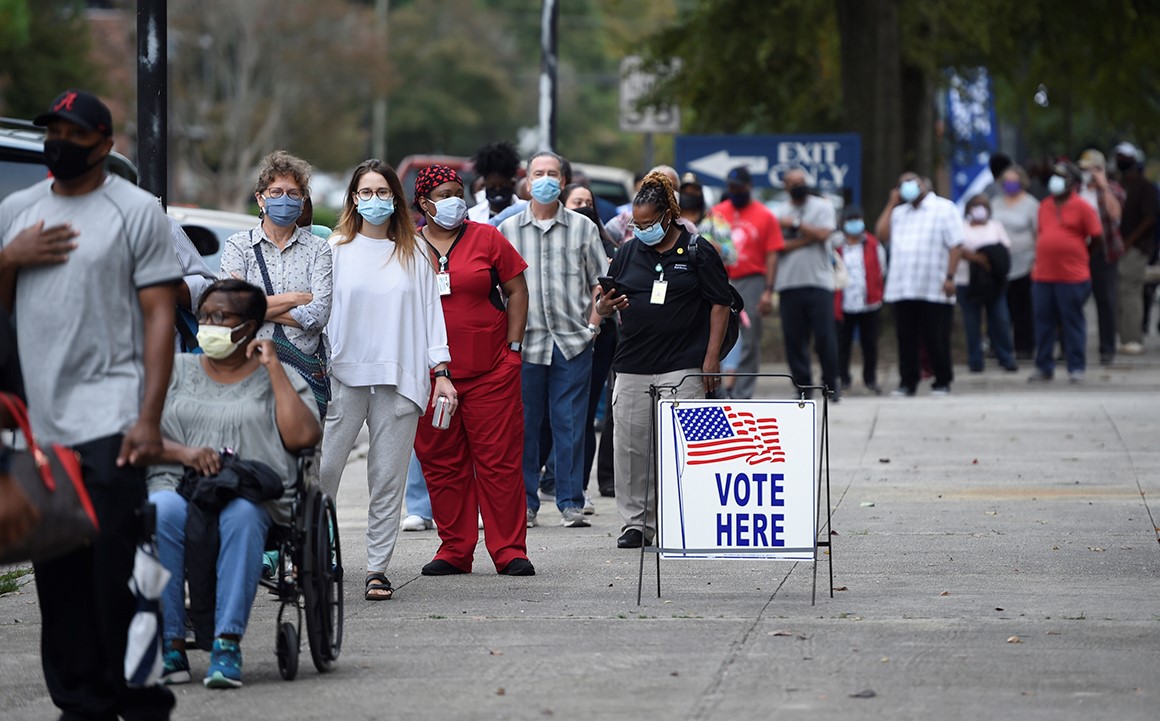On December 6, Georgia held its runoff election, in which Democrat Raphael Warnock secured a narrow victory over Trump-backed Republican Herschel Walker. Warnock’s election is not only historic in that he has become the first Black senator to be elected to a six-year term in Georgia, but it also marks a critical victory for Democrats, giving them a 51-49 majority in the Senate.
The Senate race, which mainstream media watched closely, culminated in unprecedented numbers of early ballots cast, breaking multiple state records. However, several state restrictions on voting have impeded some individuals, particularly Black voters, in casting their ballots. This makes the success of early voting in Georgia especially remarkable.
In 2021, Republican Gov. Brian Kemp signed a voter suppression law, described by voting rights advocate and former Democratic gubernatorial nominee Stacey Abrams as “Jim Crow 2.0,” which added new administrative barriers to obtaining an absentee ballot. Since 2005, Georgia law required in-person voters to provide photo ID, but the 2021 law added further ID requirements for mail-in voters to verify their identities — a burden that disproportionately affects Black voters.
Indeed, despite record turnout, voter suppression had a major impact on citizens’ ability to vote in the runoff election. Journalist Greg Palast reported extensively on the widespread difficulties encountered by voters both prior to and on election day. Whilst documenting an exceedingly long line for an early voting drop box in a predominantly Black area in Georgia, Palast claimed, “You only see these long lines in Blacklanta, where state law eliminated most drop boxes. The official wait times in white rural counties and suburbs was 10 minutes or at most half an hour.”
The cause of this, Palast explained, was the aforementioned 2021 law which limits drop boxes to no more than 1 per 100,000 active voters. “This limit affects only the 4 large Greater Atlanta (59.7% non-white) counties. The law shuttered 77% of Atlanta-area drop boxes, declining from 107 to 25,” explained Palast. “At the same time, small rural counties were required to ADD at least one drop box. The result: a big reduction in drop boxes in urban non-white counties to 55,862 voters per drop box.”
While mainstream media may have caught onto the existence of voter suppression in its most general sense, many outlets were unsuccessful in properly contextualizing the record-breaking early voter turnout, and failed to make the connection between the 2021 Georgia voting law and the obstacles voters faced.
According to Media Matters, “some mainstream print and online coverage of the Senate runoff election frequently excluded important context about Georgia voter suppression efforts, whether it was not mentioning the shorter runoff period or brushing past the voter ID law.”
A USA Today article on December 5, which reported on the tight race between Walker and Warnock, mentioned no element of voter suppression, instead choosing to focus on the fact that Georgia voters were “shattering the one-day record for early voting.” The article praised voters for “exercising their civic duty” without context that there have been additional hurdles for voters to cross in this election, such as the new voter ID requirement.
Similarly, a December 3 NBC News article focusing on voter turnout in the Georgia runoff race neglected to explain the shorter run-off voting window established by Kemp’s voter suppression law, instead highlighting the fact that voters had broken “two single-day records in about a week.”
An ABC News December 5 article whitewashed the effects of the GOP voter suppression law, saying that the shortened voting period was “condensed by lawmakers as part of a larger overhaul of state elections” and quoted Raffensperger saying “this level of voter participation is excellent.” Although the piece also quoted Abrams in saying that “turnout does not dispel voter suppression. Suppression is about barriers to access,” it failed to include a substantial explanation of the law or its impacts.
Photo: Michael Holahan/The Augusta Chronicle via AP

